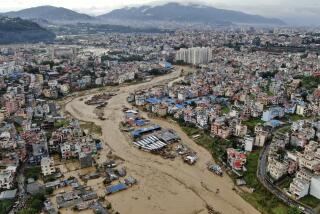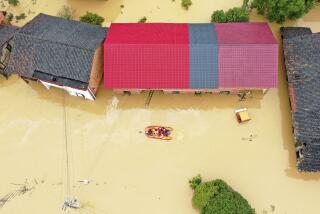Pakistan floods kill more than 400
Reporting from Islamabad, Pakistan — Three days of heavy rain and flash floods have killed at least 408 people in Pakistan, authorities said Friday, as rescue teams struggled to evacuate thousands of stranded villagers from submerged hamlets and towns in the country’s northwest.
Swollen rivers washed away mud-hut villages and wrecked bridges, roads, hospitals and communication networks across the region of Khyber-Pakhtunkhwa, formerly known as North-West Frontier Province.
The death toll was highest in the northwest, where the destruction was the “worst natural calamity in the province’s history,” Information Minister Mian Iftikhar Hussain said.
By Friday, authorities had also turned their attention to southern Punjab province, the country’s heartland, where bloated rivers had submerged thousands of acres of farmland and blocked roads.
Authorities said 20 helicopters and 100 boats were being used to rescue as many as 400,000 stranded villagers in dire need of food and drinking water.
U.S. Ambassador to Pakistan Anne Patterson said the United States was making available seven additional helicopters for rescue efforts.
“Our top priority right now is to evacuate people to safer areas,” said Gen. Nadeem Ahmed, chairman of Pakistan’s National Disaster Management Authority. “Our next priority will be health, because if issues such as sanitation aren’t taken care of, it may cause epidemics.”
Some villagers, however, complained that the government was acting too slowly in providing relief to stricken areas.
“Our women and children have been buried alive and people are dying of hunger and thirst, while ministers are flying in helicopters just for eyewash,” said Arbab Ali Akbar, a Pakistani from the northwest village of Taro Jabba.
The heavy rain submerged numerous roads as well as sections of the highway between Islamabad and northwest Pakistan’s largest city, Peshawar, hampering rescue efforts.
Pakistani authorities fear that the death toll will rise because almost all of Pakistan’s rivers remain at dangerously high levels with four weeks left in the summer monsoon season.
“The next 10 days are very crucial,” said Pakistan’s Meteorological Office chief, Qamar-uz-Zaman Chaudhry.
Special correspondent Zulfiqar Ali contributed to this report.
More to Read
Sign up for Essential California
The most important California stories and recommendations in your inbox every morning.
You may occasionally receive promotional content from the Los Angeles Times.










